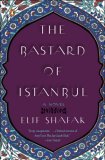Summary | Excerpt | Reading Guide | Reviews | Beyond the Book | Readalikes | Genres & Themes | Author Bio

The doctor did not look surprised. He was used to it. The women always cried.
“There, there,” he said, trying to console Zeliha while putting on a pair of
medical gloves. “It’s going to be all right, don’t you worry. It’s only a
slumber. You’ll sleep, you’ll dream, before you finish your dream, we’ll wake
you up and you’ll go home. After that, you’ll remember nothing.”
When Zeliha cried like this all of her expressions became discernible and her
cheeks sunk in, thus accentuating the most telling feature of hers: her nose!
That remarkably aquiline nose of hers, which she, like her siblings, had
inherited from their father; hers, unlike her siblings, was sharpened further on
the ridge and elongated a bit more on the edges.
The doctor patted her shoulder, handed her a tissue, and then handed her the
whole box. He always had a spare box of tissues ready by his desk. Drug
companies distributed these tissue boxes free of charge. Along with pens and
notebooks and other things that carried their company names, they made tissues
for women patients who could not stop crying.
“Figs . . . Delicious figs . . . Good ripe figs!”
Was it the same vendor or a new one? What did his customers call him . . . ?
Figist . . . ?! Zeliha thought to herself, as she laid still on a table in a
room unnervingly white and immaculate. Neither the accoutrements nor even the
knives scared her as much as this absolute whiteness. There was something in the
color white that resembled silence. Both were emptied of life.
In her endeavor to sway away from the color of silence, Zeliha grew distracted
by a black spot on the ceiling. The more she fixed her stare on it, the more the
spot resembled a black spider. First it was still, but then it started to crawl.
The spider grew bigger and bigger as the injection started to spread in Zeliha’s
veins. In a few seconds she was so heavy she could not move a finger. As she
tried to resist being carried away by the anesthetized slumber, she started to
sob again.
“Are you sure this is what you want? Perhaps you would like to mull it over,”
said the doctor in a velvety voice as if Zeliha was a pile of dust and he was
afraid of brushing her away with the wind of his words if he spoke louder. “If
you’d like to reconsider this decision, it is not too late.”
But it was. Zeliha knew it had to be done now, on this first Friday of July.
Today or never. “There is nothing to consider. I cannot have her,” she heard
herself blurt out.
The doctor nodded. As if waiting for this gesture, all of a sudden the Friday
prayer poured into the room from the nearby mosque. In seconds another mosque
joined in and then another and another. Zeliha’s face contorted in discomfort.
She hated it when a prayer originally designed to be called out in the pureness
of the human voice was dehumanized into an electro-voice roaring over the city
from microphones and cabinet speakers. Soon the clamor was so deafening she
suspected there was something wrong with the loudspeaker system of each and
every mosque in the vicinity. Either that or her ears had become extremely
sensitive.
“It will be over in a minute. . . . Don’t worry.”
It was the doctor speaking. Zeliha looked at him quizzically. Was her contempt
for the electro-prayer so obvious on her face? Not that she minded. Among all
the Kazancı women she was the only one who was openly irreligious. As a child it
used to please her to imagine Allah as her best friend, which was not a bad
thing of course, except that her other best friend was a garrulous, freckled
girl who had made smoking a habit at the age of eight. The girl happened to be
the daughter of their cleaning lady, a chubby Kurdish woman with a mustache she
did not always bother to shave. Back in those days, the cleaning lady used to
come to their house twice a week, bringing her daughter along on each visit.
Zeliha and the girl became good friends after a while, even cutting their index
fingers to mix their blood and become lifelong blood-sisters. For a week the two
girls went around with bloody bandages wrapped around their fingers as a sign of
their sisterhood. Back in those days, whenever Zeliha prayed it would be this
bloody bandage she’d be thinking about—if only Allah too could become a
blood-sister . . . -her blood-sister. . . .
Excerpted from The Bastard of Istanbul by Elif Shafak, © 2007 by Elif Shafak. Excerpted by permission of Viking Press, a division of Penguin Group. All rights reserved. No part of this excerpt may be reproduced or reprinted without permission in writing from the publisher.
No pleasure is worth giving up for the sake of two more years in a geriatric home.
Click Here to find out who said this, as well as discovering other famous literary quotes!
Your guide toexceptional books
BookBrowse seeks out and recommends the best in contemporary fiction and nonfiction—books that not only engage and entertain but also deepen our understanding of ourselves and the world around us.